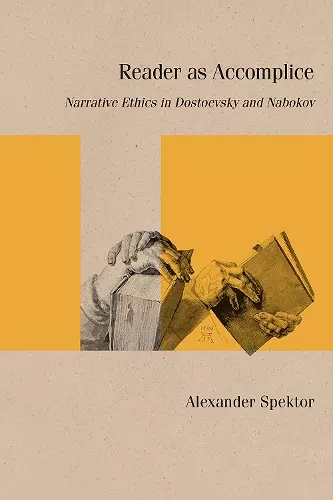Reader as Accomplice
Narrative Ethics in Dostoevsky and Nabokov
Format:Hardback
Publisher:Northwestern University Press
Published:30th Oct '20
Currently unavailable, and unfortunately no date known when it will be back

Reader as Accomplice: Narrative Ethics in Dostoevsky and Nabokov argues that Fyodor Dostoevsky and Vladimir Nabokov seek to affect the moral imagination of their readers by linking morally laden plots to the ethical questions raised by narrative fiction at the formal level. By doing so, these two authors ask us to consider and respond to the ethical demands that narrative acts of representation and interpretation place on authors and readers.
Using the lens of narrative ethics, Alexander Spektor brings to light the important, previously unexplored correspondences between Dostoevsky and Nabokov. Ultimately, he argues for a productive comparison of how each writer investigates the ethical costs of narrating oneself and others. He also explores the power dynamics between author, character, narrator, and reader. In his readings of such texts as The Meek One and The Idiot by Dostoevsky and Bend Sinister and Despair by Nabokov, Spektor demonstrates that these authors incite the reader’s sense of ethics by exposing the risks but also the possibilities of narrative fiction.
“A paradigm-setting book that boldly recasts our understanding of Bakhtin and, through him, the authors with whom he has often been placed in dialogue. Particularly important is Spektor’s profound revision of the notion of polyphony, which has (mis)guided readers of Dostoevsky for several decades. His engrossing analysis of Dostoevsky and Nabokov grows out of a transformative polemic with Bakhtin’s Problems of Dostoevsky’s Poetics, which Spektor reads through the lens of Bakhtin’s ‘dark’ work of the 1940s.” —Eric Naiman, author of Nabokov, Perversely
“Nabokov disliked Dostoevsky as artist and moralist. But Alexander Spektor, in this provocative and close-grained study, asks us to look beyond matters of personal preference to the actual working of both writers’ great novels, how they nurture and bind the reader. The result is fresh insight into the relation between authorship and freedom, reading and ethical maturation, and narrative plot inexorably experienced as acts of witnessing.” —Caryl Emerson, author of The Cambridge Introduction to Russian Literature
“Alexander Spektor’s task, to pair Dostoevsky and Nabokov, is not an easy one, and yet he succeeds. He looks at the ‘ethics of form,’ and not at the writers’ moral preoccupation (or lack thereof). In the end, Spektor’s Reader as Accomplice shows how—through intricate use of literary form—both Dostoevsky, a Christian ethicist, and Nabokov, a self-professed amoralist, create literature that puts the reader into the position of appreciating the ethical complexities and contradictions inherent in the act of writing.” —Irina Paperno, author of “Who, What Am I?”: Tolstoy Struggles to Narrate the Self
“Reader as Accomplice offers a vital and revitalizing juxtaposition of Dostoevsky and Nabokov, emphasizing the intertwined responsibilities of author, reader, and character that each of these two giant figures brought to literary art. Spektor proves dazzlingly that despite their many differences, these two writers shared profound ethical concerns about all discursive relationships, and that reading them in light of one another brings new sharpness and potential to our understanding of both. For Spektor, readers, authors, and characters all share profound ethical responsibility for the acts unfolding within and beyond the text.” —Stephen H. Blackwell, author of The Quill and the Scalpel: Nabokov's Art and the Worlds of Science
ISBN: 9780810142466
Dimensions: unknown
Weight: 633g
264 pages